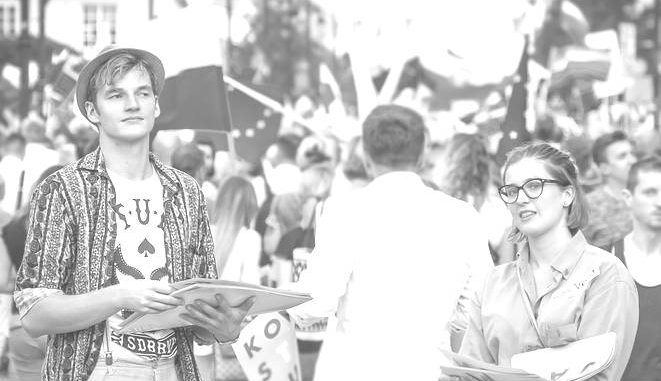
We have been very sparing in our coverage of Brexit, as we felt most articles were based upon speculation, not facts. In the past week more tangible information has become available, so we thought we would collect some links, which we feel present the best views – pro and con.
David Shirreff is one of the founders and current eidtors of BRAVE NEW EUROPE. He is a former finance and business journalist at The Economist, author of “Break up the Banks!”, and playwright
We at Brave New Europe don’t take a position on Brexit. While we recognise that many dark and odious forces lay behind the Brexit vote, and that the process will inflict significant economic damage on many people, we also know that European institutions and policies typically reflect a strong neoliberal slant – and we launched this project to oppose and change this. We have sympathy with the anger against European institutions – but we also believe in the principle of European cross-border co-operation and co-ordination in many areas. Reflecting this complex reality, we will host both pro-Brexit and pro-Remain articles.
As Britain and the EU start a week of hard negotiations, the goal-posts keep moving, while the arguments go round and round
Simon Wren-Lewis, professor of economics at Merton College, Oxford, highlights the foolishness of arguing whether aspects of leaving the EU will be more costly for Britain than remaining a member.
“But why don’t Remainers like me,” he writes, “accept that this is really a culture thing, and that Leave voters are willing to pay for their independence from the EU. One reason is that there is clear evidencethat most Leave voters believed they would at least be no worse off after Brexit, which is of course why Brexiters continue to try and rubbish estimates of how bad the hit will be.”
https://mainlymacro.blogspot.co.uk/2018/01/brexit-is-fantastic-project.html
Yanis Varoufakis, economist and former finance minister of Greece, encourages the idea of a “Norway-plus” trade agreement with the EU, after Brexit. In this respect he is on the same wavelength as Simon Wren-Lewis:
…”tactically, ideologically, it is a gross error to hammer on about the costs of leaving the single market. It works exactly like those anti-drugs posters in the early 80’s depicting drug addicts in the gutter, which drug addicts were quite happy to put up on the wall, identifying with that image. What are those who are fanatical Brexiteers thinking? Convince them that the cost of Brexit is huge, and this is going to make them even more passionately in favour. It’s a bit like the Blitz: the higher the cost, the greater the sense of solidarity that the British people will feel, against Brussels.”
Michael Romberg, committee member of London4Europe , an anti-Brexit movement, argues that it would not be sensible simply to reverse the triggering of Article 50 and stay in the EU on the same terms – Britain is now too polarised on the Brexit issue. A new referendum on the terms of EU membership would be needed. But nor is it realistic to expect the EU to revise its rules on freedom of movement, or anything else for that matter, just to keep Britain in the EU.
http://www.london4europe.co.uk/have_our_cake_and_eat_it_remain
John Springford and Sam Lowe at the Centre for European Reform, a think-tank, warn that Britain’s specialism in traded services, some of which can be delivered electronically, has led Brexiteers to claim that the country’s trade will inevitably unmoor itself from Europe. In fact, Britain is not about to enter a “post-geography trading world”.
http://www.cer.eu/insights/britains-services-firms-cant-defy-gravity-alas
Jolyon Maugham, a UK lawyer, says we should all know more about Article 50 and the decision, awaited this week, on whether it is reversible.
https://waitingfortax.com/2018/02/03/why-we-need-to-know-about-article-50/
Jacob Rees-Mogg, a back-bench Conservative MP being touted in some circles as a possible chancellor of the exchequer or even a prime minister, got himself into a shameful row last week by accusing civil servants of deliberate bias in calculating the negative effects of Brexit on trade.
http://zelo-street.blogspot.co.uk/2018/02/jacob-rees-mogg-pants-on-fire.html
Nevertheless he seems to have a following among hard-line Brexiteers who do not want Britain to remain in the customs union or single market after Brexit – his argument: Britain without EU voting rights yet within these pacts would become a “vassal” state. The hard Brexiteers have forced PM Theresa May’s hand: on February 5th she appeared “categorically” to rule out a customs union. The hidden threat to Ms May’s premiership is a palace revolution, suggested this week’s Sunday Times, a line-up with foreign secretary Boris Johnson as prime minister, environment secretary Michael Gove as his deputy, and Rees-Mogg as chancellor of the exchequer .
Richard Murphy, Professor of Practice in International Political Economy at City, University of London, has the last word:
……”Jacob Rees-Mogg currently ranks as the greatest risk to peace. I am not suggesting for a moment he would ever endorse violence. But he is already fanning what look like the sparks that could ignite flames through the recklessness of his actions and comments. And that worries me, greatly.”
http://www.taxresearch.org.uk/Blog/2018/02/04/is-jacob-rees-mogg-the-greatest-risk-to-our-peace/
Or perhaps it’s Fintan O’Toole in the Irish Times: is Brexit the maddest thing England has ever done?


Be the first to comment